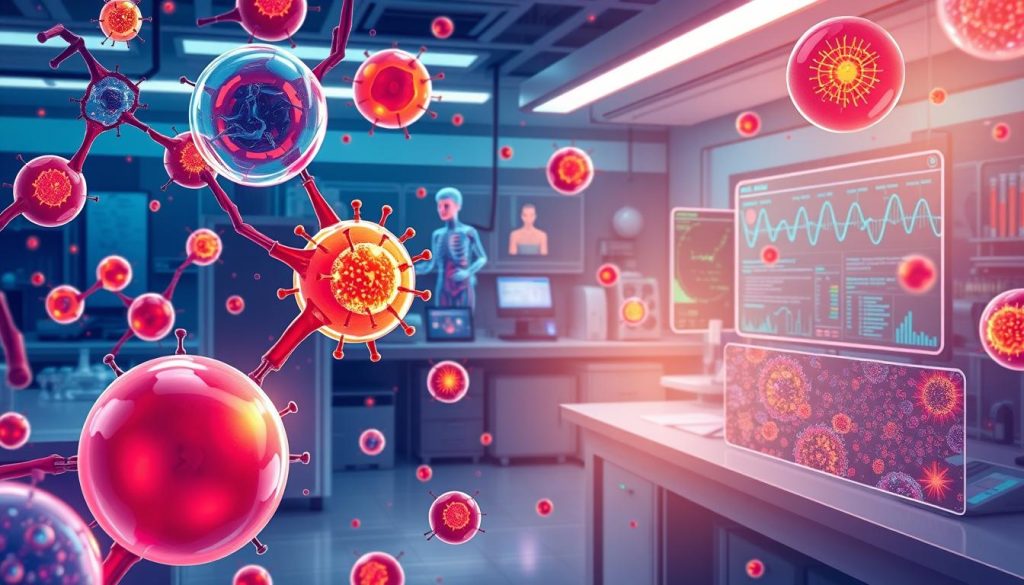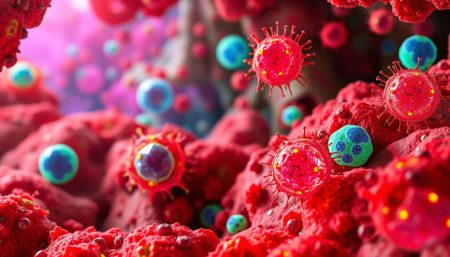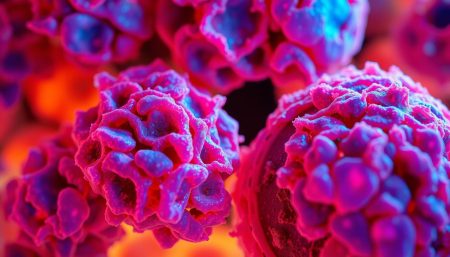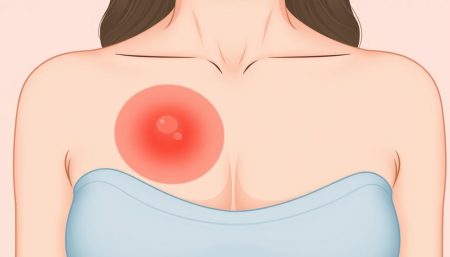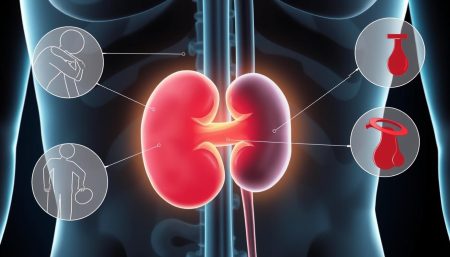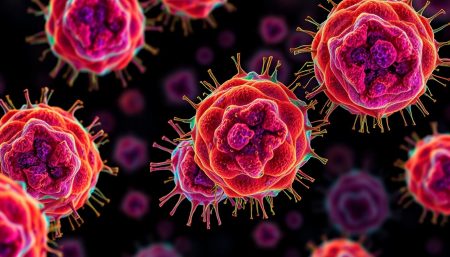CAR T-cell therapy is a new and powerful treatment for blood cancers. But, some patients might see their cancer come back after this therapy. This guide is here to help patients and their families understand and deal with relapse after CAR T-cell therapy. Seeing cancer come back after CAR T-cell therapy can be tough. It’s important for patients and their families to know the risks and signs of relapse. Knowing about treatment options and support can make patients feel more in control of their cancer journey.
We will look at many parts of relapse after CAR T-cell therapy in this guide. We’ll talk about what can cause relapse, how to keep an eye on it, and what treatments are available. We’ll also cover how to handle the emotional and mental side of cancer coming back. Our goal is to give patients and their families the right information to help them through this tough time.
Understanding CAR T-Cell Therapy and Its Effectiveness
CAR T-cell therapy is a new way to fight cancer using the body’s immune system. It changes a patient’s T-cells to find and kill cancer cells. This method is very effective against some blood cancers.
Many studies have shown CAR T-cell therapy works well. It has helped patients with blood cancers like leukemia and lymphoma. Even when other treatments fail, CAR T-cell therapy can lead to complete remission.
“CAR T-cell therapy has revolutionized the treatment of certain blood cancers, giving hope to those who have lost all other options.” – Dr. Sarah Johnson, oncologist
Not every patient responds the same way to CAR T-cell therapy. Some may see their cancer come back after it seemed gone. The chance of relapse depends on the cancer type and the CAR T-cell product used.
Scientists are trying to make CAR T-cell therapy even better. They’re working on CAR T-cells that can target more than one cancer antigen. They’re also exploring ways to use it with other treatments and to make the CAR T-cells more effective and long-lasting.
Defining Relapse in the Context of CAR T-Cell Therapy
Relapse is a big worry for those who’ve had CAR T-cell therapy for blood cancers. It happens when cancer comes back after a break from treatment. Knowing about relapse and CAR T-cell therapy is key for patients and their families.

Minimal Residual Disease (MRD) and Its Role in Relapse
Minimal residual disease (MRD) means a few cancer cells stay in the body after treatment. These cells might not show up in tests but could cause relapse. Checking MRD levels helps guess the chance of relapse after CAR T-cell therapy.
The link between MRD and relapse risk is clear:
| MRD Level | Relapse Risk |
|---|---|
| Undetectable | Low |
| Low | Moderate |
| High | High |
Monitoring for Signs of Relapse After CAR T-Cell Therapy
It’s important to watch closely for early signs of relapse after CAR T-cell therapy. This might include blood tests, scans, and bone marrow biopsies. Early detection lets doctors start treatment quickly.
Some tests used to watch for relapse are:
- Complete blood count (CBC)
- Flow cytometry
- Polymerase chain reaction (PCR) for minimal residual disease car t-cell detection
- Positron emission tomography (PET) scans
- Bone marrow aspirate and biopsy
The type and how often tests are done can change based on the patient’s risk and cancer type.
Understanding relapse, MRD, and the need for monitoring helps patients and families. They can work with their doctors to catch and treat relapse early. This improves chances of success with CAR T-cell therapy.
Factors Contributing to Relapse After CAR T-Cell Therapy
CAR T-cell therapy has been a game-changer for treating blood cancers. Yet, some patients face the challenge of relapse. Several factors can lead to this, like tumor heterogeneity, antigen escape, and the body’s immune system not working right.
Tumor Heterogeneity and Antigen Escape
Cancer cells can change and hide from the immune system. This makes it hard for CAR T-cells to find and kill them. When the target antigen is lost, cancer cells can escape, leading to relapse.
CAR T-Cell Persistence and Exhaustion
For CAR T-cells to keep fighting cancer, they need to stay active. But, they can get tired and lose their strength. This exhaustion is caused by the tumor environment and how long they face cancer cells.
“CAR T-cell exhaustion is a major barrier to achieving durable remissions in patients with advanced blood cancers.” – Dr. Michel Sadelain, Memorial Sloan Kettering Cancer Center
Tumor Microenvironment and Immunosuppressive Factors
The area around cancer cells also affects CAR T-cell therapy. Cancer can make this environment hostile to immune cells. Factors like regulatory T-cells and cytokines can weaken CAR T-cells, leading to relapse.
It’s key to understand these factors to find ways to prevent relapse. Scientists are exploring new methods to improve CAR T-cell function and overcome cancer’s defenses.
Relapse Rates and Patterns in Different Blood Cancers
Relapse rates and patterns after CAR T-cell therapy vary by blood cancer type. Knowing these differences helps patients and caregivers prepare for challenges.
In acute lymphoblastic leukemia (ALL), CAR T-cell therapy has shown great results. Many patients achieve complete remission. Yet, relapse rates are a concern. Studies show relapse rates in ALL patients treated with CAR T-cells can be 30-50% within the first year after treatment.

For patients with diffuse large B-cell lymphoma (DLBCL), CAR T-cell therapy has shown promising results. But, relapse patterns in DLBCL differ from ALL. Relapses in DLBCL often happen earlier, within the first 6 months after treatment.
The following table compares relapse rates and patterns for common blood cancers treated with CAR T-cell therapy:
| Blood Cancer Type | Relapse Rate | Typical Relapse Timing |
|---|---|---|
| Acute Lymphoblastic Leukemia (ALL) | 30-50% | Within 1 year |
| Diffuse Large B-Cell Lymphoma (DLBCL) | 30-40% | Within 6 months |
| Chronic Lymphocytic Leukemia (CLL) | 20-30% | Within 2 years |
| Multiple Myeloma | 50-60% | Within 1-2 years |
These are general patterns, and individual experiences can vary. Factors like age, overall health, and disease burden at treatment time can affect relapse risk.
Scientists are working to lower relapse rates and improve outcomes for CAR T-cell therapy patients. Open communication with the healthcare team is key for patients to understand their specific relapse risks and plan for follow-up.
Monitoring and Follow-Up Care After CAR T-Cell Therapy
After CAR T-cell therapy, regular monitoring and follow-up care are key. They help catch any complications or relapse early. This allows for quick action and adjustments in treatment.
Importance of Regular Check-Ups and Tests
Regular check-ups and tests are vital for follow-up care after CAR T-cell therapy. These include physical exams, blood tests, and imaging like CT or PET scans. How often you need these depends on your health and how well you’re doing after treatment.
At these visits, doctors check your health, watch for side effects, and see if the therapy is working. Blood tests show your blood cell counts, immune function, and if there’s cancer left.
Detecting Early Signs of Relapse
Follow-up care aims to catch relapse early. Relapse is when cancer comes back after a break. Finding it early means doctors can start treatment sooner, which can help more.
Patients and caregivers must watch for new or ongoing symptoms. These include:
- Persistent fever
- Unexplained weight loss
- Night sweats
- Enlarged lymph nodes
- Fatigue or weakness
If you notice these symptoms, tell your healthcare team right away. They might do more tests to see if it’s a relapse or something else.
| Follow-Up Care Component | Purpose | Frequency |
|---|---|---|
| Physical Exam | Assess overall health and monitor for side effects | Every 3-6 months |
| Blood Tests | Evaluate blood cell counts, immune function, and presence of cancer cells | Every 1-3 months |
| Imaging Studies (CT, PET) | Monitor for signs of relapse or disease progression | Every 3-6 months |
The key to successful follow-up care after CAR T-cell therapy is a strong partnership between patients, caregivers, and the healthcare team. By working together and maintaining open communication, we can ensure the best possible outcomes and quality of life for patients.
Regular monitoring and vigilance in detecting early signs of relapse are essential components of follow-up care after CAR T-cell therapy. By staying informed and engaged in the process, patients and caregivers can play an active role in maintaining their health and well-being after this innovative treatment.
Strategies for Preventing Relapse After CAR T-Cell Therapy
CAR T-cell therapy has been a game-changer for treating blood cancers. Yet, preventing relapse is a top priority for both patients and doctors. By using specific strategies, patients can lower their chance of relapse and improve their long-term health.
Living a healthy lifestyle is a key strategy. Patients should eat well, stay active, and find ways to manage stress. These habits boost the immune system and can make CAR T-cells more effective in fighting cancer.
Adjuvant therapies, like targeted drugs or immunomodulatory agents, can also help. These treatments target specific cancer pathways or boost the immune system. This can help eliminate any cancer cells left behind. Here’s a table showing some adjuvant therapies and how they work:
| Adjuvant Therapy | Mechanism of Action |
|---|---|
| Checkpoint inhibitors | Enhance T-cell function and prevent exhaustion |
| Targeted kinase inhibitors | Block signaling pathways that promote tumor growth |
| Vaccines | Stimulate immune response against specific tumor antigens |
Researchers are always looking for new ways to make CAR T-cells better. They want to improve how these cells target tumors and last longer. Dr. Maria Sanchez, a leading researcher, says:
By continually refining CAR T-cell technology and combining it with complementary therapies, we hope to develop more effective strategies for preventing relapse and improving patient outcomes.
Patients should team up with their doctors to create a plan for avoiding relapse. Regular check-ups, watching for cancer cells, and acting fast if cancer comes back are all important. By being proactive, patients can lower their risk of relapse and look forward to a better future.
Treatment Options for Patients Who Relapse After CAR T-Cell Therapy
Even though CAR T-cell therapy is very effective against blood cancers, some patients might relapse. It’s important to look for other treatments to manage the disease and improve outcomes. Options include salvage chemotherapy, targeted therapies, allogeneic stem cell transplantation, and new immunotherapies.
Salvage Chemotherapy and Targeted Therapies
For those who relapse, salvage chemotherapy and targeted therapies are often the first step. They aim to shrink tumors and slow disease growth. Chemotherapy is customized for each cancer type and may use a mix of drugs. Targeted therapies focus on specific cancer cell targets, making treatment more precise.
Allogeneic Stem Cell Transplantation
After salvage therapy, some patients might get allogeneic stem cell transplantation. This involves swapping the patient’s bone marrow with healthy donor stem cells. It can give a new immune system that fights cancer cells, lowering relapse risk. But, it also comes with risks like graft-versus-host disease and infections.
Novel Immunotherapies and Clinical Trials
Immunotherapy is growing fast, with new ways to tackle relapse after CAR T-cell therapy. These include:
- Dual-targeted CAR T-cells to fight cancer better
- Combining CAR T-cells with other treatments to boost effects
- Genetically modified CAR T-cells that last longer and work better
- Ready-to-use CAR T-cell products for quick access
These new treatments are being tested in clinical trials. They offer hope to those who relapse after CAR T-cell therapy. Joining clinical trials not only gives patients new options but also helps science move forward.
| Treatment Option | Mechanism of Action | Potential Benefits |
|---|---|---|
| Salvage Chemotherapy | Cytotoxic drugs that kill rapidly dividing cancer cells | Reduce tumor burden and control disease progression |
| Targeted Therapies | Drugs that target specific molecular pathways or antigens | Precise approach to treatment with fewer side effects |
| Allogeneic Stem Cell Transplantation | Replacing diseased bone marrow with healthy donor stem cells | Potentially curative option that provides a new immune system |
| Novel Immunotherapies | Innovative approaches to enhance CAR T-cell efficacy | Address challenges of relapse and improve patient outcomes |
Managing Side Effects and Complications of Relapse Treatment
When patients have a relapse after CAR T-cell therapy, they might need more treatments. These could be salvage chemotherapy, targeted therapies, or allogeneic stem cell transplantation. Each treatment has its own side effects and complications. It’s key to manage these side effects to keep quality of life high during tough times.
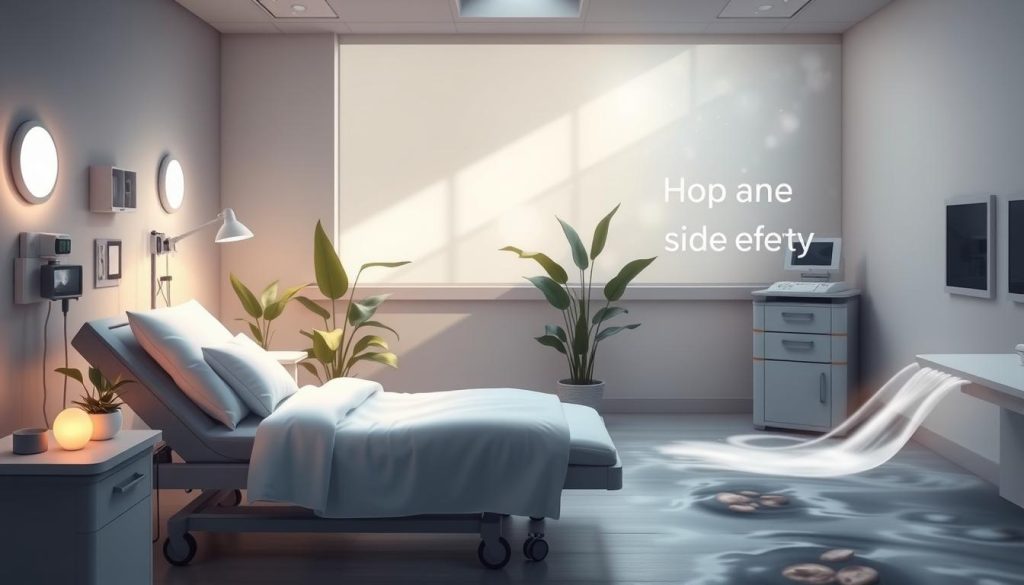
- Fatigue and weakness
- Nausea and vomiting
- Low blood counts (anemia, neutropenia, thrombocytopenia)
- Increased risk of infections
- Mouth sores and digestive issues
Complications from relapse treatment, like CAR T-cell, can also happen. For instance, graft-versus-host disease (GVHD) might occur after allogeneic stem cell transplantation. GVHD is when the donated cells attack the patient’s healthy tissues. It’s vital to watch for GVHD and treat it quickly to avoid serious problems.
Healthcare teams work hard with patients to offer supportive care. This includes:
- Anti-nausea medications
- Pain management
- Blood transfusions
- Antibiotics to prevent or treat infections
- Nutritional support
It’s important to talk openly with your healthcare team about any side effects or symptoms you experience during relapse treatment. They can help you find the best ways to manage these challenges and maintain your overall well-being.
Coping with the side effects and complications of relapse treatment requires a strong support system, including family, friends, and healthcare professionals. Patients should also focus on self-care. This means getting enough rest, staying hydrated, and doing gentle exercise when you can. By actively managing side effects and complications, patients can face relapse challenges head-on and focus on recovery.
Emotional and Psychological Impact of Relapse on Patients and Caregivers
Relapse after CAR T-cell therapy is tough for patients and their caregivers. It can lead to feelings of disappointment, fear, and uncertainty. Caregivers also face anxiety, stress, and helplessness while supporting their loved ones.
Caregivers play a big role in supporting patients through relapse. They handle emotional support, medical appointments, and navigating the healthcare system. They might feel burned out, isolated, and guilty, wondering if they could have prevented the relapse.
Coping Strategies for Patients and Caregivers
Patients and caregivers can use several strategies to cope with relapse. These include:
- Seeking professional counseling or therapy to process emotions and develop coping mechanisms
- Joining support groups to connect with others who have experienced similar challenges
- Practicing stress-reduction techniques, such as meditation, deep breathing, or yoga
- Maintaining open communication with the healthcare team to address concerns and receive guidance
- Engaging in activities that promote self-care and bring joy, such as hobbies or spending time with loved ones
Support Resources for Relapse after CAR T-Cell Therapy
There are many support resources for patients and caregivers facing relapse after CAR T-cell therapy. These include:
- Patient advocacy organizations that provide educational materials, emotional support, and financial assistance programs
- Online forums and communities where patients and caregivers can connect with others who have faced similar experiences
- Social workers and patient navigators who can help coordinate care and connect patients with local resources
- Palliative care teams that focus on managing symptoms, providing emotional support, and improving quality of life
“Relapse after CAR T-cell therapy was a devastating blow, but with the help of my support network and the resources available, I found the strength to keep fighting.” – Sarah, CAR T-cell therapy patient
By acknowledging the emotional and psychological impact of relapse, patients and caregivers can build resilience. They can find the strength to face challenges ahead by seeking out coping strategies and support resources.
Long-Term Outcomes and Quality of Life After Relapse
Patients who relapse after CAR T-cell therapy face big challenges. They need to deal with the setback and find new treatments. This journey affects their long-term health and happiness.
Research shows that some patients can get better after relapse. They might need more treatments like chemotherapy or CAR T-cell therapy again. But, the fight is not over yet.

Living well after relapse is key. Patients may struggle with physical, emotional, and social issues. Support from doctors, family, and friends is vital. It helps them stay strong and positive.
Survivors of relapse may deal with lasting effects. These can include:
- Fatigue
- Cognitive changes (e.g., “chemo brain”)
- Emotional distress, such as anxiety or depression
- Physical limitations or disabilities
- Increased risk of secondary cancers
Regular check-ups and care are important. They help manage these effects and improve life quality. This might include:
| Follow-up Care | Frequency |
|---|---|
| Physical exams | Every 3-6 months for the first 2 years, then annually |
| Blood tests | Every 3-6 months for the first 2 years, then as needed |
| Imaging scans (e.g., PET, CT) | As needed based on symptoms or concerns |
| Psychosocial support | Ongoing, as needed |
Many patients show great strength and resilience after relapse. Dr. Sarah Johnson, a leading oncologist, says, “The strength and determination of these patients is truly inspiring. With proper support and care, they can continue to lead meaningful lives and find joy in the face of adversity.”
Advances in Research Aimed at Reducing Relapse After CAR T-Cell Therapy
Researchers are working hard to make CAR T-cell therapy better. They want to lower relapse rates and help patients live longer. Recent advances in research aimed at reducing relapse after CAR T-cell have shown promising results. This gives hope to those who have seen treatment fail.
One key area is making CAR T-cells last longer in the body. By adding certain cytokines or co-stimulatory molecules, researchers hope to make them more effective. Also, “armored” CAR T-cells, designed to fight through the tumor’s defenses, are showing promise in early studies.
Another exciting approach is targeting multiple cancer markers at once. This way, CAR T-cells can fight cancer more effectively, reducing the chance of relapse. This method is being tested in blood cancers like ALL and multiple myeloma.
| Strategy | Mechanism of Action | Potential Benefits |
|---|---|---|
| Enhancing CAR T-cell persistence | Engineering CAR T-cells to express cytokines or co-stimulatory molecules | Prolonged survival and effectiveness of CAR T-cells |
| Targeting multiple antigens | Creating CAR T-cells that recognize more than one tumor-specific antigen | Reduced risk of antigen escape and relapse |
| Combining CAR T-cell therapy with other immunotherapies | Synergistic effects of different treatment modalities | Enhanced anti-tumor response and reduced relapse rates |
Using CAR T-cell therapy with other treatments, like checkpoint inhibitors, is also showing promise. This combination aims to boost the fight against cancer and lower relapse rates. Researchers believe this could lead to better outcomes for patients.
The future of CAR T-cell therapy lies in our ability to innovate and adapt. By continually pushing the boundaries of research, we can develop strategies that will help more patients achieve long-term remission and improve their quality of life.
As advances in CAR T-cell therapy relapse prevention continue, it’s vital for patients and caregivers to stay updated. Discussing these new findings with healthcare teams is key. Together, we can work towards a future where CAR T-cell therapy is more effective and relapse rates drop.
Importance of Open Communication with Healthcare Team
When facing relapse after CAR T-cell therapy, talking openly is key. Discussing concerns with your doctor and healthcare team helps you understand your situation. This way, you can make informed decisions about your care.
Your healthcare team is there to support you. They offer valuable information, guidance, and emotional support. Here are some reasons to keep talking openly with them:
- Gaining a clear understanding of your current health status and prognosis
- Discussing any new symptoms or side effects you may be experiencing
- Exploring available treatment options and their risks and benefits
- Addressing any fears, concerns, or questions you may have about your care
- Receiving emotional support and guidance on coping with the challenges of relapse

When talking to your healthcare team, be honest and open. Share your feelings, concerns, and any health changes. This helps your doctors and nurses give you the best care and support.
Consider making a list of questions before your appointments. It helps ensure you cover all your concerns. Bringing a trusted family member or friend can also be helpful. They can remember important information and offer support.
Remember, your healthcare team is your partner in navigating the challenges of relapse. By maintaining open communication and working together, you can make informed decisions and receive the best possible care.
Patient Stories and Experiences with Relapse After CAR T-Cell Therapy
Relapse after CAR T-cell therapy is tough for patients and their families. Sharing their stories, patients offer hope and support to others. These patient stories of relapse after CAR T-cell therapy show the strength and courage of those facing cancer again.
Sarah, a lymphoma survivor, had CAR T-cell therapy. But six months later, her cancer came back. “It was devastating,” she says. “But I stayed strong and got a second round of CAR T-cell therapy. It put me back in remission.”
Michael also faced a relapse. “It was a setback, but I didn’t lose hope,” he says. He joined a clinical trial for a new treatment. It’s showing good results for his relapsed disease.
“Sharing my story has been a source of strength and purpose for me. If I can help even one person feel less alone in their journey, it’s worth it.” – Jennifer, a patient who relapsed after CAR T-cell therapy
These experiences with relapse after CAR T-cell therapy highlight the need for more research. They show the importance of new ways to fight cancer. As more patients share, they help grow a community of support and push for progress in cancer treatment.
| Patient Name | Initial Diagnosis | Time to Relapse After CAR T-Cell Therapy | Subsequent Treatment | Current Status |
|---|---|---|---|---|
| Sarah | Lymphoma | 6 months | Second round of CAR T-cell therapy | In remission |
| Michael | Leukemia | 9 months | Clinical trial for novel immunotherapy | Stable disease |
| Jennifer | Multiple myeloma | 12 months | Salvage chemotherapy and stem cell transplant | In remission |
Navigating Insurance and Financial Aspects of Relapse Treatment
Dealing with the financial side of relapse treatment after CAR T-cell therapy can be tough. It’s key to know your insurance and look for financial help. This can make the extra treatments easier to handle.
Understanding Coverage for Additional Therapies
When you face relapse after CAR T-cell therapy, check your insurance well. Talk to your insurance and healthcare team about insurance coverage for relapse treatment. Here are some important things to think about:
- Know what your policy covers for CAR T-cell therapy and more treatments
- Ask about coverage for salvage chemotherapy, targeted therapies, and stem cell transplants
- Talk about the need for new treatments or clinical trials and their insurance rules
Financial Assistance Programs and Resources
Many groups and resources offer financial help for relapse treatment after CAR T-cell therapy. They can help with medical bills, travel, and more. Here are some places to look:
| Organization | Type of Assistance |
|---|---|
| The Leukemia & Lymphoma Society | Copay help, travel aid, and patient support |
| CancerCare | Financial aid, counseling, and learning resources |
| Patient Access Network Foundation | Grants for out-of-pocket costs for treatment |
“Seeking financial help was a lifeline during my relapse treatment. It allowed me to focus on healing without the added stress of medical bills.”
Remember, you’re not alone in this fight. Work with your healthcare team and social workers to find and use financial help during relapse treatment.
Maintaining Hope and Resilience in the Face of Relapse
Relapse after CAR T-cell therapy can be tough for patients and their families. It’s important to remember that a relapse doesn’t erase all the progress made. Keeping hope alive is key during this hard time.
Self-care and support systems are vital. Doing things that make you happy, like hobbies or spending time with loved ones, can lift your mood. Joining support groups or talking to others who’ve faced relapse can offer a sense of belonging. Professional help can also help you deal with your feelings and find ways to cope.
Remember, cancer research and treatments are always getting better. New ways to fight relapse are being explored. Keeping up with the latest research and talking to your healthcare team can give you hope. Even with relapse, there’s always a chance for better treatment and outcomes.
FAQ
Q: What is the likelihood of relapse after CAR T-cell therapy?
A: The chance of relapse after CAR T-cell therapy varies. It depends on the blood cancer type and the patient’s situation. Always talk to your healthcare team about your risk.
Q: How can I monitor for signs of relapse after CAR T-cell therapy?
A: Regular check-ups and tests are key. Your team will schedule follow-ups with blood tests and scans. These help catch early signs of relapse. Always go to your appointments and tell your doctor about any new symptoms.
Q: What factors contribute to relapse after CAR T-cell therapy?
A: Several things can lead to relapse. Tumor heterogeneity and antigen escape are big factors. CAR T-cell exhaustion and the tumor environment also play roles. These factors can make cancer come back.
Q: Are there strategies to prevent relapse after CAR T-cell therapy?
A: While there’s no sure way to stop relapse, researchers are looking into ways. Lifestyle changes and adjuvant therapies might help. Clinical trials are also exploring new methods to improve CAR T-cell effectiveness.
Q: What treatment options are available for patients who relapse after CAR T-cell therapy?
A: Options for relapse include salvage chemotherapy and targeted therapies. Allogeneic stem cell transplantation is also an option. Your team will help choose the best treatment for you.
Q: How can I cope with the emotional and psychological impact of relapse?
A: Relapse can be tough emotionally and mentally. Prioritize self-care and seek support. There are resources and groups for those dealing with relapse. Remember, you’re not alone, and it’s okay to ask for help.
Q: What advancements are being made in research to reduce relapse rates?
A: Researchers are working hard to lower relapse rates. They’re focusing on improving CAR T-cell persistence and targeting multiple antigens. As we learn more, we’ll see better ways to prevent and manage relapse.












